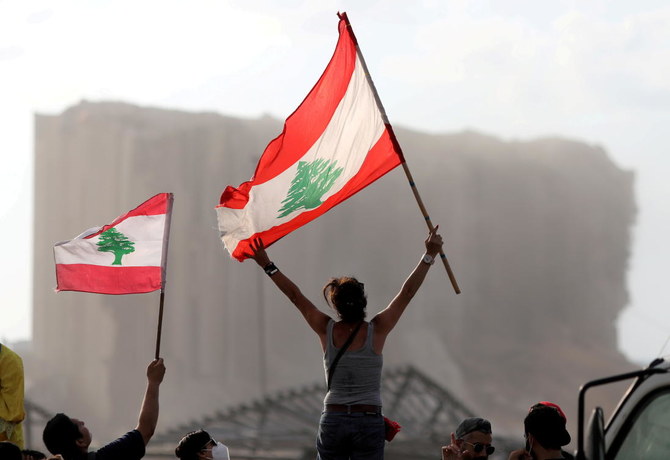BEIRUT: The Cabinet session that was scheduled for Wednesday has been adjourned as ministers were at odds following the speech of Hezbollah Secretary-General Hassan Nasrallah, the presidency’s media office announced on Wednesday.
The announcement came following consultations between President Michel Aoun and Prime Minister Najib Mikati after Nasrallah’s speech, in which he insisted on removing Judge Tarek Bitar, who is leading the investigation into the Beirut port blast.
The ministers of Hezbollah, the Amal Movement and the Marada Movement threatened to suspend their participation in the Cabinet.
According to a government source, these ministers believe that “Bitar was appointed in virtue of a decree and can thus be removed in virtue of another one.”
Aoun’s ministers and those from the Free Patriotic Movement who support Bitar have hit back, arguing that “it is not possible to remove him from the case like this, based on the principle of the separation of powers.”
Officials have stepped up their communications in an attempt to find a compromise that takes into account legal and constitutional principles.
A judicial source told Arab News: “The government issued a decree referring the crime to the Supreme Judicial Council; it did not appoint the judicial investigator. The Minister of Justice together with the Supreme Judicial Council did, and no political party has the right to take Bitar off the case.”
On Wednesday, Bitar headed to the Palace of Justice in Beirut to wait for the Court of Cassation to decide on a request to dismiss him from the case, but none of the court’s judges appeared at the Palace of Justice.
Protesters organized a sit-in in front of the Palace of Justice in Beirut in support of Bitar. A protester told Arab News: “We do not understand Nasrallah’s attack against the judiciary. What is behind this fear of the results of the investigations into the port explosion?”
Hezbollah and Amal supporters called for demonstrations on Thursday “to denounce Bitar’s actions.”
These escalating tensions could lead to a face-off between protesters in the streets. This approach was adopted following the assassination of former Prime Minister Rafik Hariri in 2005 when Hezbollah did not recognize the Special Tribunal for the Lebanese, nor its verdicts, and refused to hand over any of the accused.
Hezbollah brought Washington into its criticism of the port explosion investigation, with MP Hassan Fadlallah releasing a statement on Wednesday that said the US State Department’s position on the probe is “a direct intervention in the investigations to divert them from the right track, in order to keep them within the US political agenda to settle scores with the resistance and its allies in Lebanon.”
The State Department urged the Lebanese authorities “to complete a swift and transparent investigation into the horrific explosion in the Port of Beirut. The victims of the August 2020 port explosion deserve justice; they deserve accountability. We support Lebanon’s judicial independence. Judges must be free from threats and intimidation, including Hezbollah’s.”
The department added in a press briefing: “We’ve long been clear that Hezbollah’s terrorists and illicit activities threaten Lebanon’s security, stability, and sovereignty. Hezbollah, we believe, is more concerned with its own interests and those of its patron, Iran, than in the best interests of the Lebanese people.”
Bitar had suspended his inquiry into the explosion on Tuesday after being notified of a dismissal request from the defendants, MP Ali Hassan Khalil and Ghazi Zeaiter, as part of the pressure exerted on him.
Minutes before he halted his inquiry, Bitar issued an arrest warrant in absentia against Khalil for refusing to appear for questioning on Tuesday.
Hezbollah and the politicians who are accused of “negligence and causing the death and injury of hundreds of people,” are insisting on a trial before the Supreme Council for the Trial of Presidents and Ministers instead of the Supreme Judicial Council.
On Wednesday, the head of the Lebanese Forces Party, Samir Geagea, called on those who are subject to Hezbollah’s intimidation to “immediately resign, starting with the president — who is supposed to be vigilant about respecting the Constitution — the prime minister and the government.”
The solidarity of the Lebanese government did not last long, with division breaking out at its first real test.
Meanwhile, the Lebanese pound was being traded at 21,000 pounds to the dollar on the black market. This devaluation affected fuel prices, chaos prevailed in markets, and public transportation drivers threatened to take to the streets.
In a brief report published on Wednesday, the World Bank warned of the Lebanese authority’s “ambiguity in terms of the solutions it is putting together, and the Central Bank’s reluctance to explain the details of its plans and perceptions.”
The World Bank expressed fears of “the ongoing depletion of the Central Bank’s reserves, albeit at slower rates.”
The report expected “a further deterioration in economic indicators related to the direct living situation and an increase in the proportion of groups suffering under poverty in all its dimensions.”



























